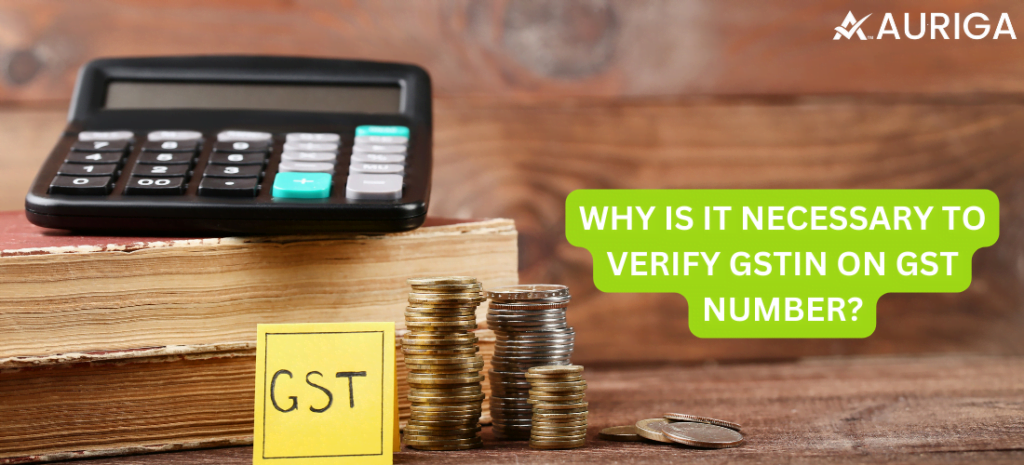WHY IS IT NECESSARY TO VERIFY GSTIN ON GST NUMBER?
Introduction
Toggle
WHY IS IT NECESSARY TO VERIFY GSTIN ON GST NUMBER?
INTRODUCTION
The Goods and Services Tax Identification Number (GSTIN) is a 15-digit alphanumeric code that is assigned to all registered taxpayers under the Goods and Services Tax (GST) regime in India. It is used to identify taxpayers and track transactions under the GST system.
Why is it necessary to verify GSTIN?
There are a few reasons why it is necessary to verify GSTIN:
- To ensure that you are dealing with a genuine taxpayer.
- To avoid fraud and misuse of the GST system.
- To claim input tax credit (ITC) on eligible expenses.
- To comply with the GST laws.
ADVANTAGES
Authenticity and Trust: Verifying a GSTIN helps in confirming the legitimacy of a business. This enhances trust between businesses and their customers, suppliers, and government authorities.
Input Tax Credit (ITC): Businesses can claim Input Tax Credit on the GST paid on purchases only if the supplier’s GSTIN is valid and accurate. Verifying GSTINs ensures that ITC claims are genuine and helps businesses save on taxes.
Legal Compliance: It is mandatory for GST-registered businesses to display their GSTIN on invoices and other documents. Verifying GSTINs helps in ensuring that businesses adhere to this legal requirement.
Reduced Tax Evasion: Verifying GSTINs can help curb tax evasion, as businesses with fake or invalid GSTINs can be identified and reported to tax authorities.
Streamlined Transactions: For B2B transactions, verifying GSTINs helps businesses avoid fraudulent or non-compliant partners, making transactions more secure and efficient.
DISADVANTAGES
Privacy Concerns: Verifying GSTINs may involve accessing sensitive business information, which could raise privacy concerns if not handled securely.
False Positives: There is a possibility of false positives, where a legitimate business may have a discrepancy in its GSTIN due to administrative errors or data entry mistakes. This can lead to unnecessary hassles for genuine businesses.
Technical Challenges: Verifying GSTINs may require access to a reliable and up-to-date database, which can be technically challenging, especially for small businesses or startups.
Costs and Resources: Maintaining a system for GSTIN verification, especially for large-scale operations, can be costly in terms of infrastructure, manpower, and technology.
Dependency on Third Parties: Many businesses rely on third-party services or government portals for GSTIN verification. Any downtime or technical issues with these services can disrupt business operations.
Here are some of the ways to verify GSTIN:
- You can verify the GSTIN on the GST portal.
- You can use a third-party GSTIN verification service.
- You can ask the vendor to provide you with a copy of their GST registration certificate.
It is important to verify the GSTIN of any vendor or supplier before you do business with them. This will help to protect you from fraud and ensure that you are complying with the GST laws.
CONCLUSION
Verifying GSTIN is a necessary step to ensure that you are complying with the GST laws and avoiding fraud. However, it is important to be aware of the limitations of the verification process.
HOW AURIGA ACCOUNTING HELP YOU
Access to Government Databases: Some accounting software or services have integrations with government databases that contain GSTIN information. They can query these databases to verify the validity and authenticity of a GSTIN. This helps ensure that you are dealing with legitimate businesses.
Real-time Validation: Accounting software can perform real-time validation of GSTINs as you enter them into your system. If a GSTIN is invalid or incorrect, the software can flag it for correction.
Bulk Verification: For businesses that need to verify GSTINs in bulk, some accounting software may offer batch processing capabilities. This is useful when you have a large number of suppliers or customers to verify.
Auto-Population of GSTIN: Some accounting software can auto-populate GSTIN information based on the GSTIN entered by the customer or supplier. This reduces manual data entry errors.
Notification of Expired GSTINs: Accounting software can provide notifications when a supplier’s GSTIN is about to expire or has expired. This ensures that you are not transacting with businesses that are no longer GST-registered.
Audit Trail: Many accounting software solutions maintain an audit trail of transactions. This can be useful for tax authorities and businesses alike to verify the accuracy of GSTINs in past transactions.
Compliance Checks: Accounting software can perform compliance checks to ensure that your business is only transacting with GST-registered businesses, which is often a requirement to claim Input Tax Credits (ITC).
Reporting and Documentation: Accounting software can generate reports and maintain records of GSTIN verification for your business’s documentation and compliance purposes.



